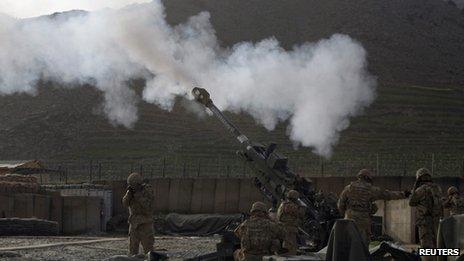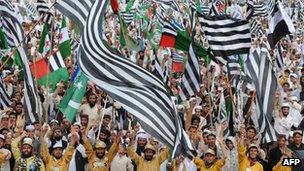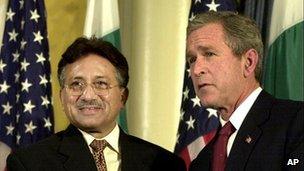Afghan end game sees Pakistan 'paralysed' by US rift
- Published

Nato operations near the Afghanistan-Pakistan border have added to tensions between Washington and Islamabad
Since US forces killed Osama Bin Laden in Pakistan a year ago, relations between the two countries have never recovered. Writer Ahmed Rashid looks at a relationship in crisis as US troops prepare to withdraw from Afghanistan in 2014.
The continuing breakdown in co-operation between the US and Pakistan is having a hugely detrimental effect on US and Nato resolve to withdraw from Afghanistan while trying to remain committed to the region's stability.
Although the US has much to answer for in terms of mistakes made, the refusal of the Pakistani leadership - both military and civilian - to take responsibility and ownership for desperately needed decisions, is leading the country into a terrible sense of drift and despair.
The recent visit to Islamabad by a high-level US delegation, consisting of officials from the defence and state departments, the CIA, the White House, and led by US special envoy Marc Grossman failed to elicit any major breakthrough in resolving any of the major outstanding issues which could lead to improving relations.
Drone attacks
Pakistan insists on a US apology for the killing of 24 of its soldiers last November by US helicopters on the Afghan border - yet when a US apology was on the cards a few months ago, Pakistani officials declined to meet their US counterparts.
Pakistan also insists on an end to drone strikes which the US refuses to agree to.
Both sides have tried to explore different scenarios for co-operation so that drone attacks can continue.
If a co-operation mechanism can be found, the US wants Pakistan to be more transparent about drone attacks because Pakistani interests are also served when drones kill leading members of the Pakistani Taliban.

Activists in Quetta protested against reopening the Nato supply route to Afghanistan during the US visit
US officials say their own lack of transparency over drones was dictated by former President Pervez Musharraf who insisted that they never be admitted to, even though drones took off from Pakistani bases until last year.
Also stuck is the reopening of the road that is used to take supplies from the port of Karachi to Nato forces in Afghanistan.
The road should have reopened nearly a month ago after approval from Pakistan's parliament, but threats by Islamic extremist groups to burn trucks and convoys of goods have played a part in the delay.
The US has already indicated that it is willing to pay generously for use of the road.
The talks were made more complicated by the Obama administration now refusing to issue an apology and US charges that Pakistan allowed the Haqqani group to launch the multiple suicide attacks on Kabul and other Afghan cities on 15 April.
'Window on the West'
There is enormous frustration in Washington regarding Pakistan which is now seen by many in the US Congress and the military as an enemy rather than a friend.
Many leading Americans consider that Pakistan should cease being important for the US, or should no longer be considered an ally when the US gets over the 2014 withdrawal from Afghanistan.
Pakistan is doing little to stop this drift in negative opinion growing in the US.
Gone are the early days of the Obama administration when major efforts were made to woo Pakistan.
Now what Pakistan may lose as a US ally in the region, India will gain - something that should be worrying for the Pakistani ruling elite.
The failure of Pakistan to rebuild ties with the US is rooted in actual incidents, anger and real disputes.
But it is also down to the inability of the government or the military to make decisions that need to be taken collectively to preserve the state of relations with a powerful country which has acted in the past as Pakistan's window to the West - especially in terms of loans, aid and business and exports.

After the 9/11 attacks George Bush forged closer ties with Pervez Musharraf
Internal conflict
There has been an unprecedented growth in violence from north to south involving sectarian, ethnic, militant Islamic, criminal and other heavily armed groups which the government appears helpless to stop.
Even those areas once considered the most peaceful, such as the Northern Areas, are wracked by mayhem.
Equally, religious minorities can no longer rely on the state to protect them and are being targeted at will.
Many, such as the Christians, are fleeing the country if they can.
Equally vital is the desperate need for tough decisions on economic reforms, austerity, greater income generation and a resolution to the power crisis through tackling the circular debt that plagues the electricity industry and is now estimated to be at US $6bn.
Afghanistan
Afghanistan remains the key foreign policy issue for the military which dominates all foreign policy decision making, yet the military itself seems paralysed by its inability to heal its rift with the Americans so that it can address talks with the Taliban and other issues.
Pakistan wants to see the end of the US occupation of its neighbour while the military has always been determined to play a major role in determining the end game in Afghanistan.
The end game is now upon us and yet everything Pakistan is not doing appears to be distancing itself further from any relevance to the future of Afghanistan and the region post-2014 when the Americans do leave.
This is precisely the moment when the country should be at its most united and pragmatic so that it can deal with the enormous issues that surround the US departure.
Instead the country is at its most disunited and unable to take even the simplest decisions while Islamic extremist groups have been allowed to take over the streets with their demands for a never ending confrontation with the US, the West and India.
Pakistan's decision makers need to be more decisive on issues of law and order, the economy and foreign policy to give people hope that a democratic form of government will prevail.
<italic>Ahmed Rashid, has just published his fifth book, 'Pakistan on the Brink; The Future of America, Pakistan and Afghanistan.' </italic>
- Published31 December 2011
- Published14 September 2011
- Published1 February 2012
- Published3 January 2012